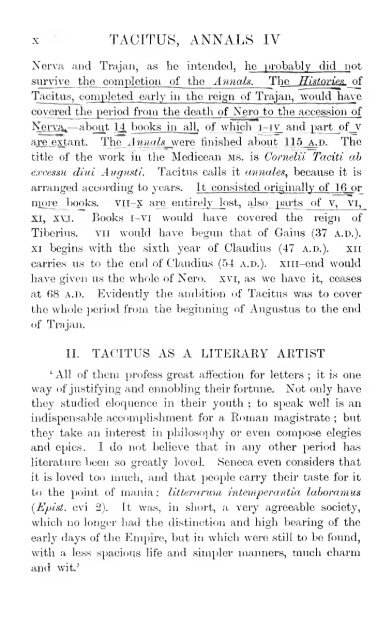Create successful ePaper yourself
Turn your PDF publications into a flip-book with our unique Google optimized e-Paper software.
X<br />
-<br />
TACITUS, ANNALS IV<br />
Nerva and Trajan, as he intended, he probably did n ot<br />
survive the completion <strong>of</strong> the Annals. <strong>The</strong> JTixtnripx <strong>of</strong><br />
<strong>Tacitus</strong>, completed early in the reign <strong>of</strong> Trajan, would have<br />
covered the period from the death <strong>of</strong> Nero to the accession <strong>of</strong><br />
Nerva,^—about IJ, books in all. <strong>of</strong>_vyhk;h i-iv and part_<strong>of</strong>_v<br />
are extant. <strong>The</strong> Annals ^vexQ finished about 115^D. <strong>The</strong><br />
title <strong>of</strong> the work in the Medicean MS. is Cornelii Taciti ab<br />
excessu diui Augusti. <strong>Tacitus</strong> calls it annales, because it is<br />
arranged according to years. It consisted originally <strong>of</strong> 16 or<br />
more book s, vil^ are entirely lost, also parts <strong>of</strong> v, vi,<br />
XE^ X^. Books i-vi would have covered the reign <strong>of</strong><br />
Tiberius. vii would have begun that <strong>of</strong> Gains (37 A.D.).<br />
XI begins with the sixth year <strong>of</strong> Claudius (47 a.d.). xii<br />
carries us to the end <strong>of</strong> Claudius (54 a.d.). xiii-end would<br />
have given us the whole <strong>of</strong> Nero, xvr, as we have it, ceases<br />
at 68 A.D. Evidently the ambition <strong>of</strong> <strong>Tacitus</strong> was to cover<br />
the whole period from the beginning <strong>of</strong> Augustus to the end<br />
<strong>of</strong> Trajan.<br />
II. TACITUS AS A LITERAEY ARTIST<br />
' All <strong>of</strong> them pr<strong>of</strong>ess great affection for letters ; it is one<br />
way <strong>of</strong> justifying and ennobling their fortune. Not only have<br />
they studied eloquence in their youth ; to speak well is an<br />
indispensable accomplishment for a Roman magistrate ;<br />
but<br />
they take an interest in philosophy or even compose elegies<br />
and epics. I do not believe that in any other period has<br />
literature l)een so greatly loved. Seneca even considers that<br />
it is loved too much, and that people carry their taste for it<br />
to the point <strong>of</strong> mania : litterarum intemperantia laboramus<br />
{Epist. cvi 2). It was, in short, a very agreeable society,<br />
which no longer had the distinction and high bearing <strong>of</strong> the<br />
early days <strong>of</strong> the Empire, but in which wei-e still to be found,<br />
with a less spacious life and simpler manners, much charm<br />
and wit.'

















